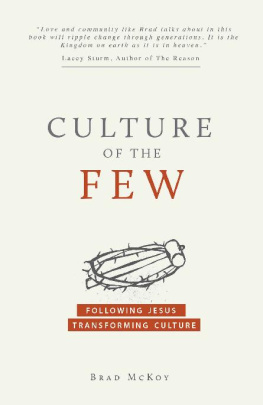Most unusual insights, alongside a popular style of writing he has opened my mind and touched my heart, making scripture and truth come alive. A must read for those who want to be on the cutting edge of vital 21st century issues.
GERALD COATES, founder of Pioneer, speaker, author and broadcaster
A fresh and intriguing approach to the figure of Jesus in the Gospels. It is widely recognized that Jesus scandalized some of his contemporaries, especially the religious elite, but Instone-Brewer takes this idea much further. He draws on his extensive knowledge of rabbinic literature to show us in detail how much of Jesus behaviour and teaching must have appeared shocking. But Instone-Brewer wears his learning lightly. His lively style and the parallels he draws with our own society will appeal to a wide range of readers.
PROFESSOR RICHARD BAUCKHAM, FBA, FRSE
A thought-provoking book packed with background material that is both well-researched and well written. It brings new colours to the Gospels and helps explain the scandalous teaching and behaviour of Jesus. Read it and see why the gospel is called good news.
IAN COFFEY, author and teacher
Applied theology at its best a scholar painstakingly working to understand the thought-world of the first century New Testament, and a pastor painstakingly applying its message to a whole host of twenty-first century problems. Written in an accessible, engaging and appropriately humorous style you will be illumined, challenged and immensely helped. Highly recommended!
DR STEVE BRADY, Principal, Moorlands College, Christchurch
Revd Dr David Instone-Brewer is a Baptist Minister who was seconded to the academic world by his denomination. He is now the Senior Research Fellow in Rabbinics and the New Testament at Tyndale House in Cambridge. He has written several academic books and articles on early Judaism and the Bible, as well as regular contributions to Christianity magazine. Other interests include computer programming and lowbrow movies.
THE JESUS SCANDALS
W HY HE SHOCKED HIS CONTEMPORARIES
(AND STILL SHOCKS TODAY)
DAVID INSTONEBREWER

Copyright 2012 by David Instone-Brewer.
The right of David Instone-Brewer to be identified as author of this work has been asserted by him in accordance with the Copyright, Designs and Patents Act 1988.
All rights reserved. No part of this publication may be reproduced or transmitted in any form or by any means, electronic or mechanical, including photocopy, recording or any information storage and retrieval system, without permission in writing from the publisher.
First published in the UK in 2012 by Monarch Books
(a publishing imprint of Lion Hudson plc)
Wilkinson House, Jordan Hill Road, Oxford OX2 8DR, England
Tel: +44 (0)1865 302750 Fax: +44 (0)1865 302757
Email:
www.lionhudson.com
ISBN 978 0 85721 023 4 (print)
ISBN 978 0 85721 265 8 (epub)
ISBN 978 0 85721 263 4 (Kindle)
ISBN 978 0 85721 266 5 (PDF)
Distributed by:
UK: Marston Book Services, PO Box 269, Abingdon, Oxon, OX14 4YN
USA: Kregel Publications, PO Box 2607, Grand Rapids, Michigan 49501
All quotations from Scripture are the authors own translation.
British Library Cataloguing Data
A catalogue record for this book is available from the British Library.
Cover image: iStockphoto/Eldad Carin
Contents
Acknowledgments
Id like to thank all those who have helped this book grow in particular, John Buckeridge and Ruth Dickinson at Christianity magazine and Tony Collins of Lion Hudson for their encouragement; Sheron Rice for her editorial work; the team at Lion Hudson including Jenny Ward, Roger Chouler, and Simon Cox for their specialist help; and last, but by no means least, my wife, Enid, and daughters, Alice and Joanne, for their support and for keeping me real.
Cambridge, 2011
Introduction
I work at Tyndale House, a research institute in Cambridge which specializes in biblical studies. A huge number of scholars from all over the world come here for short or long visits, so Im forever hearing the latest discoveries and theories, and Im surrounded by all the books and facilities I need to research them further.
Some of these coffee-break-length chapters started life as articles in Christianity magazine and I have added many others in a similar style. During the research and writing process I have been at different times annoyed, amazed, dismayed, delighted and always surprised.
My personal presuppositions are that Jesus is who he claimed to be in the Gospels, and that these accounts represent what actually happened. But, of course, many people, including some of my academic colleagues, have different conclusions, so often I address more sceptical viewpoints.
To understand Jesus we have to know something about Jews of the time, and to understand the Gospels it helps a great deal if we read them with the mindset of a first-century Jew or Gentile the people for whom they were written. My specialist area of research is early rabbinic Judaism, but this book also delves into other forms of Judaism such as that of the Dead Sea Scrolls, and into Roman and Greek culture. When we look at the Gospels through the eyes of someone from these cultures, they appear very different problems in understanding the text are often solved and unexpected details take us unawares.
This book may challenge many traditional interpretations, but its aim is to find a foundation for historical facts about Jesus. Surprisingly, as the first chapter shows, scandals are a good place to look.
Why Look for Scandals?
Scandals are our best guarantee of historical truth in the Gospels. When disgraceful, embarrassing and shocking details about Jesus are recorded by his friends and supporters, it is much harder to disbelieve them.
Jesus was accused of being a bastard, blaspheming, abusing alcohol, partying with prostitutes, being mad and working for Satan in other words, scandal followed him. And a huge part of his teaching and ministry tackled head-on the scandals that pervaded society and would therefore have been regarded as scandalous by his audience.
Scandals are the inconvenient truths which the Gospels could not omit without being dismissed as fiction by their first readers. If there had been no scandals, the Gospel writers wouldnt have invented them why create potential reasons for people to dismiss Jesus? And if there were scandals, the original readers would remember, so the Gospel writers had to mention them and make a reply.
These scandals supply inadvertent confirmation for Christian claims. The fact that Jesus was charged with blasphemy indicates that he did claim divinity. The fact that he was stigmatized as illegitimate gives at least some credence to the stories of a miraculous birth though sceptics would say it was a reason for inventing such stories. The fact that he spent time with prostitutes and gangsters indicates that he really did teach that anyone could have their life transformed. And the fact that he was charged with doing miracles by Satans power demonstrates that even his enemies believed his miracles were real.
The Gospels are a model of how not to win friends and influence people. Their primary audience consisted of Jews and those Gentiles who were friends of Jews, because most of the early converts came from these groups. And yet the Gospels regularly include criticisms of Jewish leaders and generally accepted Jewish beliefs and attitudes. From the financial scams of the Temple to the belief that God rejects all disabled people and that illness is due to sin, Jesus spoke against many Jewish teachings and practices in embarrassingly public ways.










